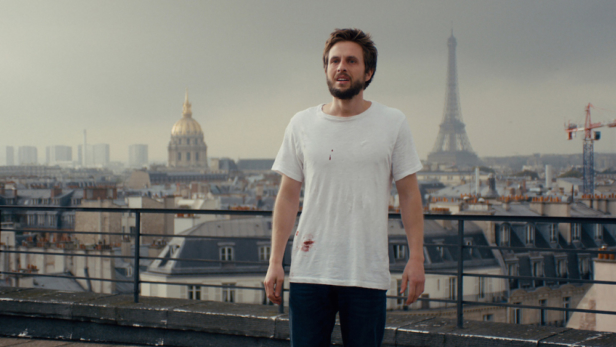Everything you need to know about Sam (Anders Danielsen Lie) is carefully laid out in the prologue to The Night Eats The World (La nuit a dévoré le monde) – the feature debut of director Dominique Rocher which he co-wrote with Jérémie Guez, and Guilaume Lemans.
Returning one night to the Parisian apartment of his ex Fanny (Sigrid Bouaziz) to pick up some childhood cassettes that she had accidentally taken when she left, he finds himself in the middle of a boisterous party there, being bumped and jostled by a crowd of revelling strangers. Sam just wants to get his stuff and leave, but Fanny, distracted by her new boyfriend Mathieu (David Kammenos) and their guests, insists that he stay until she finds a minute to talk privately with him. So Sam waits and waits, an intense and alienated figure amid all the merrymaking – until eventually he locks himself in a backroom and falls asleep. Sam’s immense loneliness, his sense of being trapped, and his conflicting desires to revisit his past and to move on – all discernible in this prologue – are precisely the characteristics that the rest of the film will play out at much greater length through the tropes of genre.
Sam wakes up to a zombie apocalypse. It is a scenario familiar enough that Rocher need not, and does not, dwell on the horrific mechanics of its rapid spread. Instead, his focus is firmly on Sam, who, as quick as we are to grasp what is going on, secures first Fanny’s apartment, and then the whole building, to be his safe space among all the ambient chaos. One might at first imagine that this will be like Yannick Dahan and Benjamin (no relation) Rocher’s La Horde (2009), with its similar premise of a residential Parisian edifice surrounded by the ravenous undead – but The Night Eats The World is far more interested in psychology than in action, and features very few actual encounters between Sam and zombies – apart from his regular, entirely one-sided conversations with ‘Alfred’ (the brilliant Denis Lavant), caged in a lift and kept permanently at a tantalising remove from Sam.
That one-sidedness is key to a film whose protagonist’s isolation readily drifts into manic solipsism and imaginative excursions. Like Robinson Crusoe or the Last Man On Earth or the Omega Man, Sam is profoundly alone. Even as he takes stock of the available provisions and settles into a lengthy routine of survival, he also returns to his old cassettes and reverts to childish habits, banging the drum just to make a noise even if his only audience regards him as food and is dangerously drawn to the sound. Here, we are confined not just to the building but entirely to Sam’s headspace, so that it becomes as difficult for the viewer as for Sam to tell the difference between reality and nightmare. Indeed, it is quite possible that the entire post-prologue film is a fitful dream of beleaguerment as Sam sleeps alone in his ex-girlfriend’s backroom, surrounded by the unwelcome noise of partying. On any reading, Sam’s experiences are also an allegory of his psychological journey, as he learns to let go, to leap beyond his safety zone, and to survey new horizons.
“Dead is the norm now,” Sam tells Alfred. “I’m the one who’s not normal.” Sam’s strong feelings of estrangement, evident right from the outset, are what propel this unusual and engaging spin on the zombie post-apocalypse. Adapted from the novel La nuit a dévoré le monde (2012) by Martin Page (writing under the pseudonym Pit Agarmen), Rocher’s The Night Eats The World stands alone and apart from its subgenre, and is the better for it.
The Night Eats the World screened at Fantasia 2018
